Meatball Borscht: nutrient-dense, ideal for autoimmune and gut health.
When I think back to my childhood in Romania, one of the dishes that instantly comes to mind is Ciorba de Perisoare—our beloved Meatball Borscht. This soup holds a special place in my heart, as it was something my family would often make, especially during colder months. The tangy flavor of sauerkraut juice mingling with the savory meatballs brings a level of comfort that words can barely describe. Even after all these years and many changes in my diet, this soup remains a cherished favorite, adapted to fit my autoimmune protocol while still capturing the essence of what I loved about it growing up.
This version of Meatball Borscht is not just a meal, but a reflection of my journey. It’s hearty, nourishing, and offers a taste of my roots with every spoonful. I’ve taken care to keep it as close to the traditional recipe as possible while making it autoimmune-friendly, so you can enjoy it too, even if you’re on the AIP diet.
Why This Soup is Special to Me:
Growing up, this soup wasn’t just a meal; it was a symbol of warmth and family. My mother would often make it when we had guests over, or during festive times. The smell of the broth slowly simmering, the way the meatballs would rise to the surface, and the tartness of the sauerkraut juice all evoke memories of home. Even now, living far away from Romania, I make this soup and feel connected to my heritage.
I’ve adapted the recipe to align with my AIP journey, but it still tastes just as comforting as I remember. Every spoonful brings me back to my grandmother’s kitchen, where love and food always went hand in hand.
A Closer Look at the Ingredients
Each ingredient in this Meatball Borscht (Ciorba de Perisoare) holds a special place, not only for its flavor but also for its contribution to the nourishing nature of this dish. Let me walk you through why each one is included, and how it reflects both tradition and health.
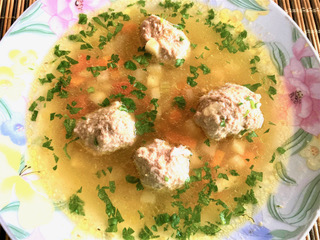
1. Beef Bones (1-1.5 lb)
The foundation of any good soup is its broth, and beef bones provide a rich, deeply flavorful base for this borscht. Simmering the bones for hours extracts beneficial nutrients like collagen and minerals into the broth, resulting in a nutrient-dense liquid that’s both healing and delicious. Bone broth soothes the gut, making it especially beneficial for those with autoimmune conditions like mine.
2. Filtered Water (8-9 cups)
Filtered water is used to create a clean, pure broth. It’s essential to use good quality water, as it’s the base of your soup. Using filtered water ensures you’re not adding any unwanted chemicals or impurities, which is especially important when you’re making something as health-focused as this soup.
3. Onion (1, finely diced and divided)
Onion forms the aromatic backbone of many soups, including this one. I add half of the onion to the broth, where it imparts a natural sweetness as it cooks down, while mixing the other half into the meatballs for a savory depth of flavor. Onions are rich in antioxidants and have anti-inflammatory properties, making them a great addition to any autoimmune-friendly recipe.
4. Carrots (3-4 large, diced)
Carrots not only bring a touch of sweetness to balance the tangy sauerkraut juice, but they’re also packed with beta-carotene, which converts to vitamin A in the body. This supports immune function and eye health. Carrots are a common vegetable in Romanian soups, and their bright color also adds a visual appeal to the dish.
5. Celery Stick (1, diced)
Celery is a classic ingredient in broths, adding a subtle, earthy flavor to the soup. It’s rich in fiber, helping to support digestion, and contains anti-inflammatory compounds that make it a good fit for anyone managing autoimmune conditions. The crisp texture of celery softens during cooking but still provides a nice contrast to the richness of the meatballs.
6. Celery Root (1 medium, diced)
Celery root, or celeriac, adds a more intense and concentrated celery flavor compared to the stalks. Its creamy texture when cooked makes it a wonderful addition to the broth. In Romania, celeriac is often used in soups for its unique flavor profile. Plus, it’s a great source of vitamin K, important for bone health.
7. Ground Turkey or Beef (1 lb)
You can use either turkey or beef for the meatballs, depending on your preference. I tend to alternate between the two, as both bring their own flavor. Turkey makes for a lighter meatball, while beef offers a richer taste. Regardless of which you choose, both are great sources of high-quality protein, essential for muscle repair and overall health.
8. Sweet Potato (1, diced)
Sweet potatoes are a great way to add natural sweetness to the soup, while also providing an excellent source of vitamins and fiber. In this recipe, the sweet potato balances the sourness of the sauerkraut juice. Since potatoes are not AIP-friendly, sweet potatoes are a wonderful substitute, providing nutrients like vitamin A, vitamin C, and manganese.
9. Parsley (2-3 tbsp, chopped)
Fresh parsley is added at the end for a burst of color and flavor. It’s not just a garnish; parsley is a nutritional powerhouse, rich in vitamins A, C, and K. It’s also known for its anti-inflammatory and detoxifying properties. In Romanian cuisine, parsley is used frequently to finish soups, offering brightness and a touch of freshness.
10. Sauerkraut Juice (2-3 cups)
This is the secret to authentic Romanian borscht. Sauerkraut juice gives the soup its characteristic tangy flavor, balancing the richness of the meatballs and broth. It also adds a dose of probiotics, which support gut health. If you’re not a fan of sauerkraut juice, you can omit it, but it’s what truly makes this soup special. Plus, the juice is naturally salty, so you won’t need to add much extra seasoning.
11. Sea Salt (¼ tsp)
A small amount of sea salt is added for flavor, especially if you’re not using sauerkraut juice. Sea salt is less processed than table salt and contains trace minerals that can support overall health. I tend to use sea salt sparingly, allowing the natural flavors of the ingredients to shine through.
12. Kelp (1/8 tsp)
Kelp is added as a natural source of iodine, which is especially important for those of us managing thyroid health, like with Hashimoto’s. It’s a great alternative to iodized salt and contributes to the overall mineral content of the soup. In small quantities, it enhances the flavor without being overpowering.
13. Grass-Fed Beef Gelatin (1 tsp)
I substitute eggs with grass-fed beef gelatin to bind the meatballs, ensuring the recipe remains AIP-compliant. Gelatin not only binds the meatballs, but also adds additional collagen, which is beneficial for gut healing and joint health.
14. Cold Water (3 tbsp)
This is used to “bloom” the gelatin, preparing it to be incorporated into the meatball mixture. Blooming gelatin is a simple process, but it’s essential to ensure the meatballs hold together without falling apart in the broth.
15. No-Tomato Paste (1 cup)
Instead of traditional tomato paste, which is nightshade and not AIP-friendly, I use a no-tomato paste alternative. This gives the soup a deep, rich flavor without the inflammatory effects that tomatoes can have for those on the autoimmune protocol. There are several no-tomato paste recipes available, often made from ingredients like carrots, beets, and sweet potatoes.
Each of these ingredients contributes to the depth of flavor and nourishment in this Meatball Borscht. Together, they create a balanced dish that’s rich in nutrients, supportive of autoimmune health, and filled with the comforting flavors I grew up with. I hope you enjoy this adaptation of a Romanian classic, whether you’re following the AIP diet or simply looking for a wholesome, satisfying soup.
How to make this soup:
Prepare the Broth: Start by placing the beef bones in a deep pot, covering them with cold water, and bringing it to a boil. Before it reaches boiling, skim off any scum that forms on the surface to ensure a clear broth. cover the pot and reduce the heat to low, allowing it to simmer gently.
Add Vegetables: Once the scum has stopped forming, add the carrots, celery root, celery stick, and half of the onion into the pot. These root vegetables lend a depth of flavor to the soup that is both sweet and earthy. Cover the pot and let the broth simmer for another 1 -1.5 hours, allowing the bones to fully release their nutrients and the vegetables to become tender.
Prepare the Gelatin Egg: In a small bowl, make a gelatin egg by sprinkling gelatin over the surface of warm water. Allow it to bloom for 1-2 minutes, then whisk it over low heat until frothy. This acts as a binder for the meatballs, giving them structure without using traditional eggs.
Make the Meatballs: In a mixing bowl, combine the ground turkey or beef with the remaining diced onion, sea salt, kelp, and the prepared gelatin egg. Using a teaspoon, scoop out the mixture and shape it into meatballs, roughly 1 inch in diameter. These meatballs are tender and juicy, a perfect complement to the tangy broth.
Cook the Meatballs: Lower the heat to the pot with the broth, then carefully add the meatballs one by one. Let them cook for 10-15 minutes. You’ll know they’re done when they rise to the surface of the soup.
Final Touches: Once the soup is finished, remove it from the heat and stir in the sauerkraut juice, if using. The sauerkraut juice is what gives this soup its signature tangy kick and is packed with probiotics. Sprinkle freshly chopped parsley on top, and it’s ready to serve.
MEATBALL BORSCHT (ROMANIAN “CIORBA DE PERISOARE”)
Course: SOUPS AND SALADSCuisine: Romanian, German, PolishDifficulty: Medium8
servings30
minutes2
hours30
minutes130
kcalMeatball Borscht (Ciorba de Perisoare) is a traditional Romanian soup that warms the soul with its rich flavors and nourishing ingredients. This hearty dish features tender meatballs made from ground turkey or beef, simmered in a savory bone broth infused with aromatic vegetables like carrots, celery, and sweet potato. The unique addition of sauerkraut juice gives the soup a tangy kick, enhancing its probiotic benefits and making it a perfect comfort food. Enjoy this delightful recipe as a nourishing meal that brings a taste of Romania to your table!
Ingredients
1-1.5 lb beef, chicken or turkey bones
8-9 cups filtered water
1 onion, finely diced (divided in two portions)
3-4 large carrots, diced
1 celery stick, diced
1 medium celery root, diced
1 lb ground turkey, chicken or beef (depending on preference)
1 small, sweet potato, diced
2-3 tbsp parsley, chopped (to garnish)
2-3 cups juice from sauerkraut (optional, but recommended)
¼ tsp sea salt
1/8 tsp kelp
1 tsp grass-fed beef gelatin
3 tbsp warm water
1 cup no-tomato sauce or paste
Directions
- Place the beef bones in a deep pot, covering them with cold water, and bringing it to a boil. Before it reaches boiling, skim off any scum that forms on the surface to ensure a clear broth. cover the pot and reduce the heat to low, allowing it to simmer gently.
- Once the scum has stopped forming, add the carrots, celery root, celery stick, and half of the onion into the pot.
- Cover the pot and let the broth simmer for another 1 -1.5 hours, allowing the bones to fully release their nutrients and the vegetables to become tender. Normally, if the pot is covered the water does not evaporate during the whole time while the liquid is simmering. If you see however that the level of the water diminished feel free to add water.
- In a small bowl, make a gelatin egg by sprinkling gelatin over the surface of warm water. Allow it to bloom for 1-2 minutes, then whisk it over low heat until frothy. This acts as a binder for the meatballs, giving them structure without using traditional eggs.
- In a mixing bowl, combine the ground turkey or beef with the remaining diced onion, sea salt, kelp, and the prepared gelatin egg.
- Using a teaspoon, scoop out the meat mixture on one hand. With your other hand shape the meat mixture into meatballs, about 1 inch in diameter.
- Lower the heat to the pot with the broth, then carefully add the meatballs one by one. Let them cook for 10-15 minutes. You’ll know they’re done when they rise to the surface of the soup.
- Once the soup is finished, remove it from the heat and stir in the sauerkraut juice, if using. The sauerkraut juice is what gives this soup its signature tangy kick and is packed with probiotics. Sprinkle freshly chopped parsley on top, and it’s ready to serve.
Notes
- Sauerkraut Juice: If you’re new to using sauerkraut juice, it adds a tangy flavor and a dose of probiotics. If you prefer a milder soup, you can reduce the amount or omit it entirely, but it truly enhances the authentic Romanian taste.
- Gelatin Egg Alternative: If you’ve reintroduced eggs into your diet after the AIP elimination phase, feel free to substitute the gelatin egg with one beaten egg in the meatball mixture for easier binding.
- Sweet Potatoes: Sweet potatoes are used instead of regular potatoes to keep the recipe AIP-friendly. If you’re not following AIP strictly, you can substitute with white or red potatoes for a more traditional version.
- Bone Broth: The longer you simmer the beef bones, the richer and more flavorful your broth will be. If you’re short on time, you can use pre-made bone broth, but homemade adds the most flavor and health benefits.
- Seasoning Adjustments: Taste the soup before adding extra salt, as the sauerkraut juice already contains some saltiness. Adjust the seasoning according to your taste preferences.
- Storage and Freezing: This soup stores well in the fridge for up to 3 days and can also be frozen for later use. The flavors deepen over time, so it’s even better the next day!



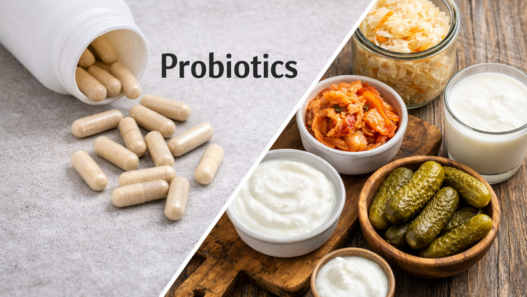





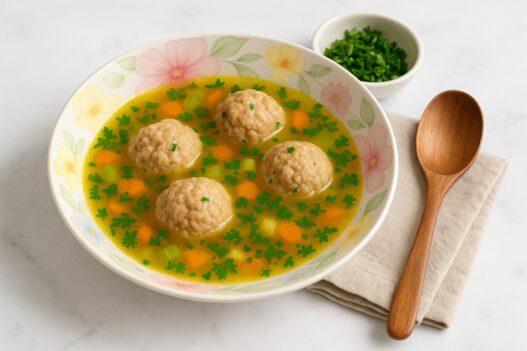
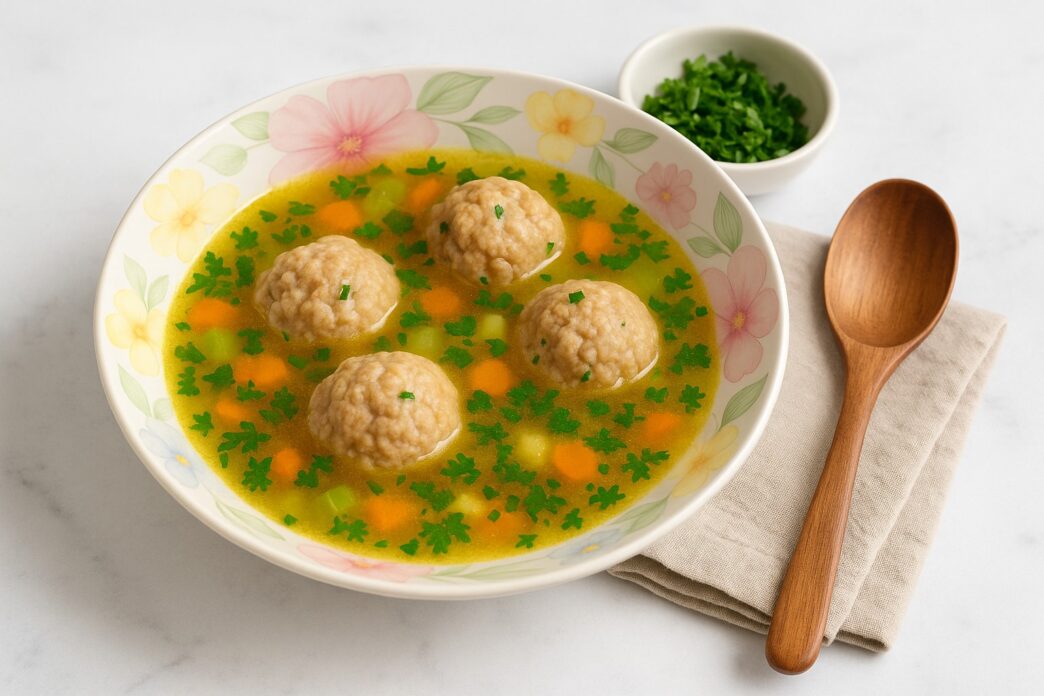
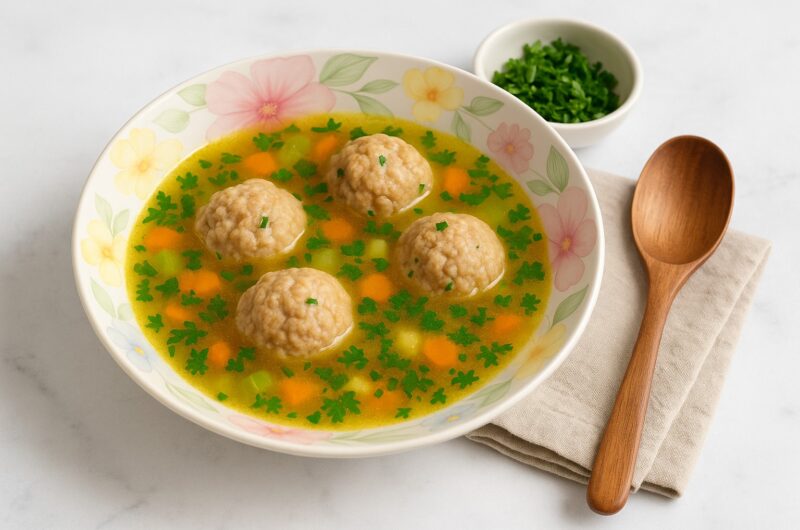


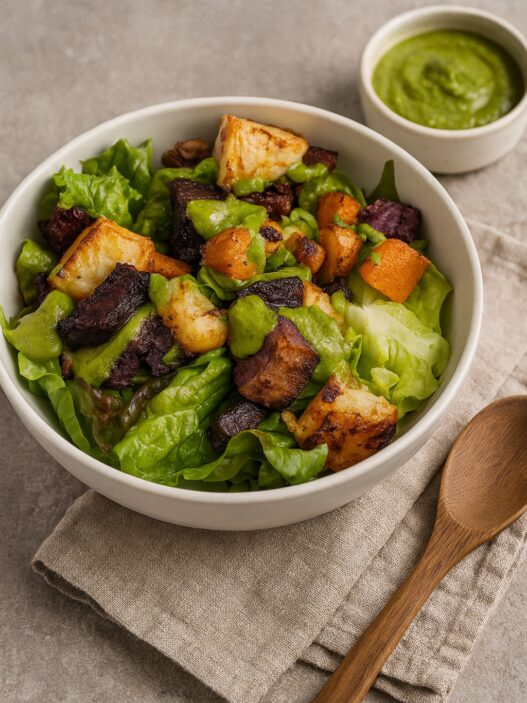
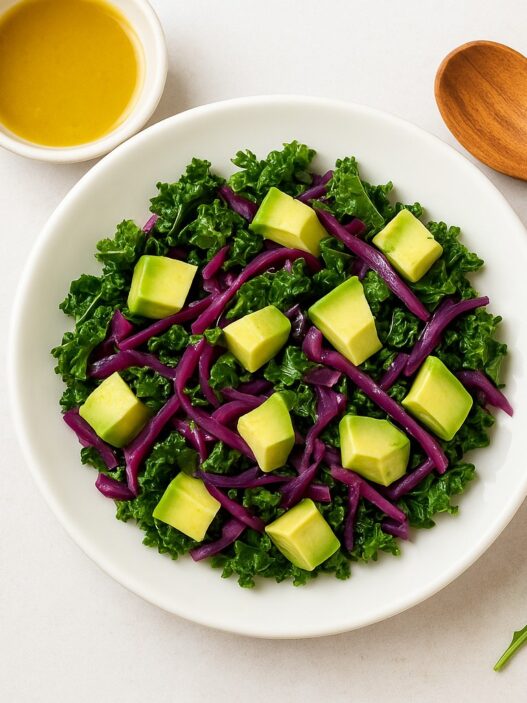
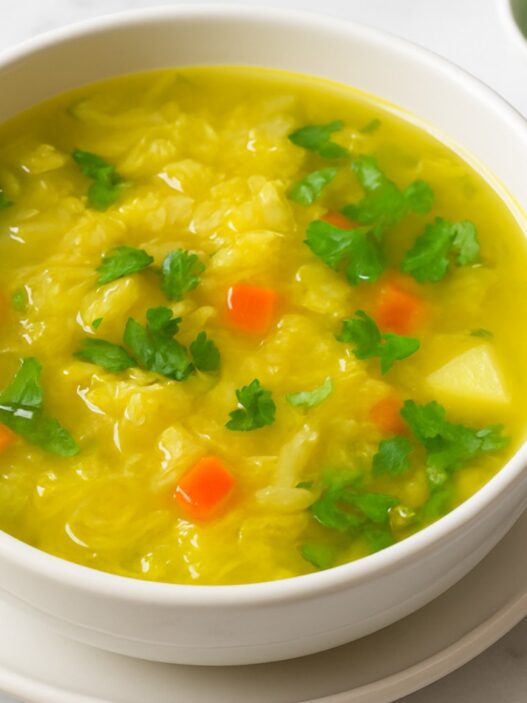

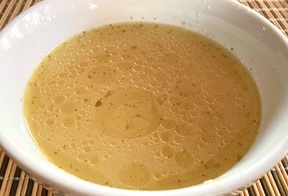
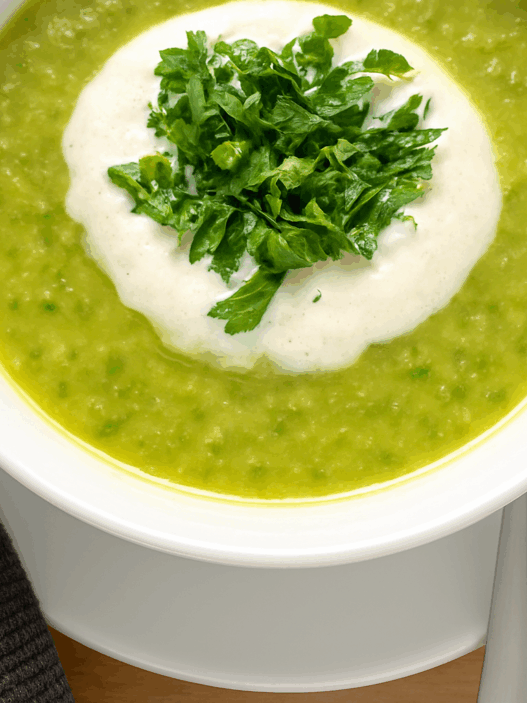

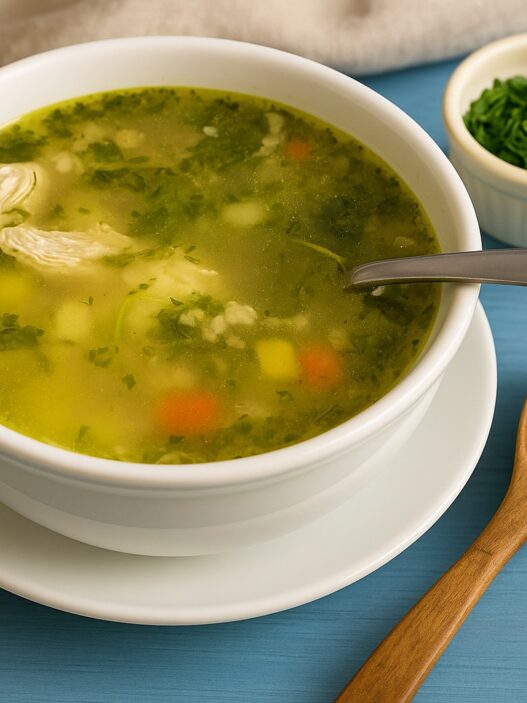


I love how you described the process of preparing this dish, especially how it connects to your childhood memories! It’s amazing how the recipe combines traditional ingredients with health benefits, creating something both nostalgic and nutritious. You conveyed so much care and emotion that it makes me want to try it and create my own special memories with this recipe. Thank you for sharing
Thank you so much for your thoughtful words! I’m so glad the recipe resonated with you and that it sparked those feelings of connection and nostalgia. It’s wonderful to hear that you’re inspired to try it and create your own memories! I truly believe food has the power to bring both comfort and nourishment, and I’m happy to share that with you. 😊 Enjoy, and I’d love to hear how it turns out!